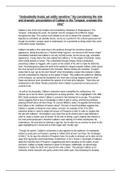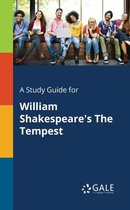“Undoubtedly brutal, yet oddly sensitive.” By considering the role
and dramatic presentation of Caliban in the Tempest, evaluate this
view”
Caliban is one of the most complex and contradictory characters in Shakespeare’s ‘The
Tempest’, embodying the poetic, the pathetic and the savagely evil at different stages
throughout the play. This causes much debate as to how to interpret his character. Caliban,
depicted as animalistic yet partially human, serves as a symbol for the colonial oppressed and
though his primitive, savage nature is emphasised, he is presented as being nobler than some
of the other human characters.
Caliban’s brutality is first made clear to the audience through his monstrous physical
appearance. Being described as a “freckled whelp hag-born, not honoured with human shape”
immediately indicates that Caliban is not only not fully human, but he has an ugly, animalistic
appearance. Young shares this view stating that Caliban is “on the edges of humanity”, being
never wholly animal or human. This is illustrated through Gregory Doran’s production,
presenting Caliban as haggard, with a spine on the outside of his skin to make his deformity
clear. His physiognomy plants the seed of the audience’s disgust towards Caliban, which grows
the more we learn of and experience the character. Before meeting the character, Prospero
states that he was “got by the devil himself” which immediately creates links between Caliban
and hell, presenting the character as the spawn of Satan. This justifies the audiences’ disliking
of the character, as, during the Elizabethan era, there was a strong religious belief in which
Satan and demons were considered the epitome of evil and sinful attitudes. These links are
emphasised in the Globe Theatre production where Caliban is presented as being red and
covered in dirt.
As well as his physicality, Caliban’s instinctive nature exemplifies his ruthlessness. His
instincts are to eat his dinner, presenting him as being primitive. This is highlighted in the 1980
BBC Studio production where Caliban is covered in hair likening him to an ape. This primitive
nature suggests that he has no knowledge of what is right or wrong, and that he prioritises
pleasing himself above all other things. As Joanna Williams states, his appetite demonstrates
that Caliban is the “antithesis of human reason”. His lack of moral knowledge suggests that
Caliban is capable of doing the most callous, evil acts. An example of this is his other
instinctive desire to “seek to violate the honour of (Prospero’s) child” in order to “people else
this isle with Calibans”. His brutality is very clear here as his instinct was to rape Miranda in
order to create a master race of himself. At the time of writing, a girl’s virginity was viewed as
her most prized possession, therefore Caliban’s near staining of it further emphasises his
malevolence. Not only does he attempt to rape her, but he also has no remorse for what he did,
again highlighting he is brutal and as Keith Sagar said “morally ugly”.
Through his speech, Caliban’s viciousness is also apparent to the audience. He repeatedly
wishes to cause pain on Prospero, wanting to “blister (him) all over” and have “the red plague
rid (him).” As he says this directly to Prospero’s face, his cruelty is stressed, as he does not shy
away from saying the most brutal things. Furthermore, in Act 1 Scene 2, the length of Caliban’s
speeches matches that of Prospero’s suggesting that when speaking on the subject of pain
and harm, Caliban is equally matched in power to Prospero. Additionally, he almost begs
Stephano to “batter his skull” and “paunch him with a stake”. This portrays Caliban as an
extremely violent character who gains comfort from others pain, thus illustrating his brutality.





